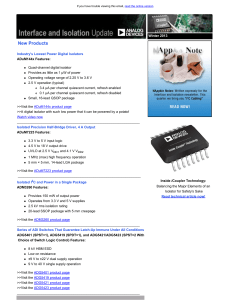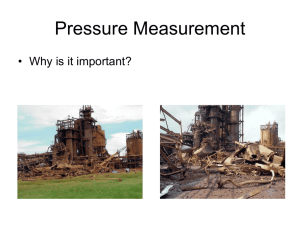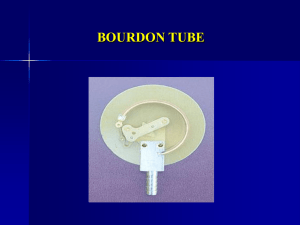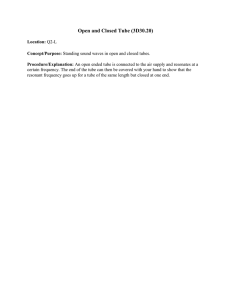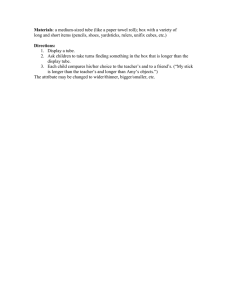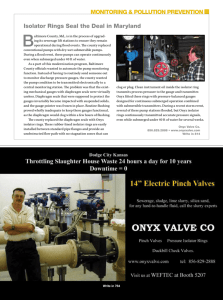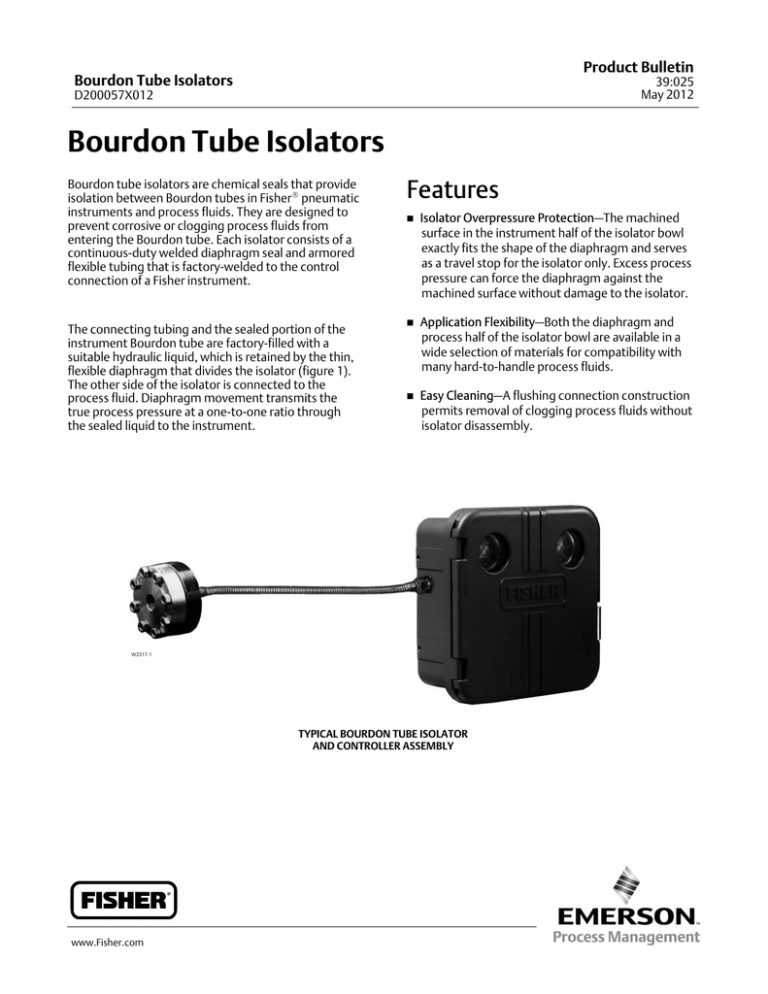
Product Bulletin
Bourdon Tube Isolators
39:025
May 2012
D200057X012
Bourdon Tube Isolators
Bourdon tube isolators are chemical seals that provide
isolation between Bourdon tubes in FisherR pneumatic
instruments and process fluids. They are designed to
prevent corrosive or clogging process fluids from
entering the Bourdon tube. Each isolator consists of a
continuous‐duty welded diaphragm seal and armored
flexible tubing that is factory‐welded to the control
connection of a Fisher instrument.
The connecting tubing and the sealed portion of the
instrument Bourdon tube are factory‐filled with a
suitable hydraulic liquid, which is retained by the thin,
flexible diaphragm that divides the isolator (figure 1).
The other side of the isolator is connected to the
process fluid. Diaphragm movement transmits the
true process pressure at a one‐to‐one ratio through
the sealed liquid to the instrument.
Features
n Isolator Overpressure Protection—The machined
surface in the instrument half of the isolator bowl
exactly fits the shape of the diaphragm and serves
as a travel stop for the isolator only. Excess process
pressure can force the diaphragm against the
machined surface without damage to the isolator.
n Application Flexibility—Both the diaphragm and
process half of the isolator bowl are available in a
wide selection of materials for compatibility with
many hard‐to‐handle process fluids.
n Easy Cleaning—A flushing connection construction
permits removal of clogging process fluids without
isolator disassembly.
W2317‐1
TYPICAL BOURDON TUBE ISOLATOR
AND CONTROLLER ASSEMBLY
www.Fisher.com
Product Bulletin
Bourdon Tube Isolators
39:025
May 2012
D200057X012
Specifications
Maximum Isolator Input Pressure
Process Connection Sizes
Without Flushing Connection: J 1/4, J 3/8, J 1/2,
J 3/4, J 1, or J 1‐1/2 NPT
With Flushing Connection: J 1/4, J 3/8, J 1/2, J
3/4, or J 1 NPT
172 bar (2500 psig) standard; up to 689 bar
(10 000 psig) available upon request
Output Pressure To Instrument(1)
Same as isolator input pressure
Connecting Tubing
Size and Construction: 3.2 mm (1/8‐inch) outside
diameter tubing protected by 7.9 mm (5/16‐inch)
flexible armor soldered at each end, roll‐pinned to
isolator, and welded to instrument process
connection
Length: J 3 m (10 feet) (standard), J shorter lengths
available at no extra cost, J greater lengths may be
ordered
Construction Materials
Bourdon Tube Bowl: Forged steel
Typical Diaphragm and Process Bowl Material
Combinations: See table below
Diaphragm
Temperature Ratings and Hydraulic Liquid
Information
See table 1
316L SST
Exposed Surfaces of
Process Bowl
316 SST
Notes
Standard construction
materials - For optional
materials, contact your
Emerson Process
Management sales office.
1. The pneumatic instrument Bourdon tube will yield if the isolator output pressure is greater than the Bourdon tube maximum pressure.
Table 1. Fill Fluids
Fill Fluid
Process Temperature Limits(1)
Viscosity in Centistokes
_C
_F
Mansfield & Green AAA
Tester Oil
-1 to 150
30 to 300
16 cs at 38_C (100_F)
3.3 cs at 99_C (210_F)
Dow CorningR 200,
Silicone ‐ 20cs
-45 to 205
-49 to 401
20 cs at 25_C (77_F)
Dow Corning 200
Silicone ‐ 10cs
-45 to 205
-49 to 401
10 cs at 25_C (77_F)
1. This temperature range is for the filled liquid in the Bourdon tube isolator. The temperature at the pneumatic instrument Bourdon tube cannot exceed the ambient temperature range of the
pneumatic instrument to which the Bourdon tube isolator is connected.
2
Product Bulletin
Bourdon Tube Isolators
39:025
May 2012
D200057X012
Installation
Ordering Information
The Bourdon tube isolator must not be disassembled,
nor any of the connections between it and the
Bourdon tube broken, as any air admitted will destroy
the accuracy of the process indications. To avoid
kinking the armored flexible tubing, while at the same
time maintaining the integrity of the sealed system,
install the process connection into the isolator bowl,
rather than vice versa.
When ordering, specify:
Bowl dimensions are shown in figure 1.
3. Flushing connection, if desired
Figure 1. Internal Construction and Dimensions of
Bowl
4. Operating temperature range and hydraulic liquid
1. Type number and control connection size of Fisher
pneumatic instrument for which isolation is desired
(no bellows instruments may be specified)
2. Process connection size
5. Diaphragm and process bowl materials
6. Length of tubing, if other than 3 m (10 feet)
WELDED
DIAPHRAGM
LIQUID FILL
PROCESS
CONNECTION
SIZE (NPT)
87.4 DIA
(3.44)
CONNECTION FOR
ARMORED TUBING
49.3
(1.94)
12A2070‐A
10A4902‐D
A1625‐1
OPTIONAL
1/4‐18 NPT
FLUSHING
CONNECTION
mm
(INCH)
3
Product Bulletin
39:025
May 2012
Bourdon Tube Isolators
D200057X012
Neither Emerson, Emerson Process Management, nor any of their affiliated entities assumes responsibility for the selection, use or maintenance
of any product. Responsibility for proper selection, use, and maintenance of any product remains solely with the purchaser and end user.
Fisher is a mark owned by one of the companies in the Emerson Process Management business unit of Emerson Electric Co. Emerson Process Management,
Emerson, and the Emerson logo are trademarks and service marks of Emerson Electric Co. Dow Corning is a registered trademark of Dow Corning
Corporation. All other marks are the property of their respective owners.
The contents of this publication are presented for informational purposes only, and while every effort has been made to ensure their accuracy, they are not
to be construed as warranties or guarantees, express or implied, regarding the products or services described herein or their use or applicability. All sales are
governed by our terms and conditions, which are available upon request. We reserve the right to modify or improve the designs or specifications of such
products at any time without notice.
Emerson Process Management
Marshalltown, Iowa 50158 USA
Sorocaba, 18087 Brazil
Chatham, Kent ME4 4QZ UK
Dubai, United Arab Emirates
Singapore 128461 Singapore
www.Fisher.com
E
4 1990, 2012 Fisher Controls International LLC. All rights reserved.

